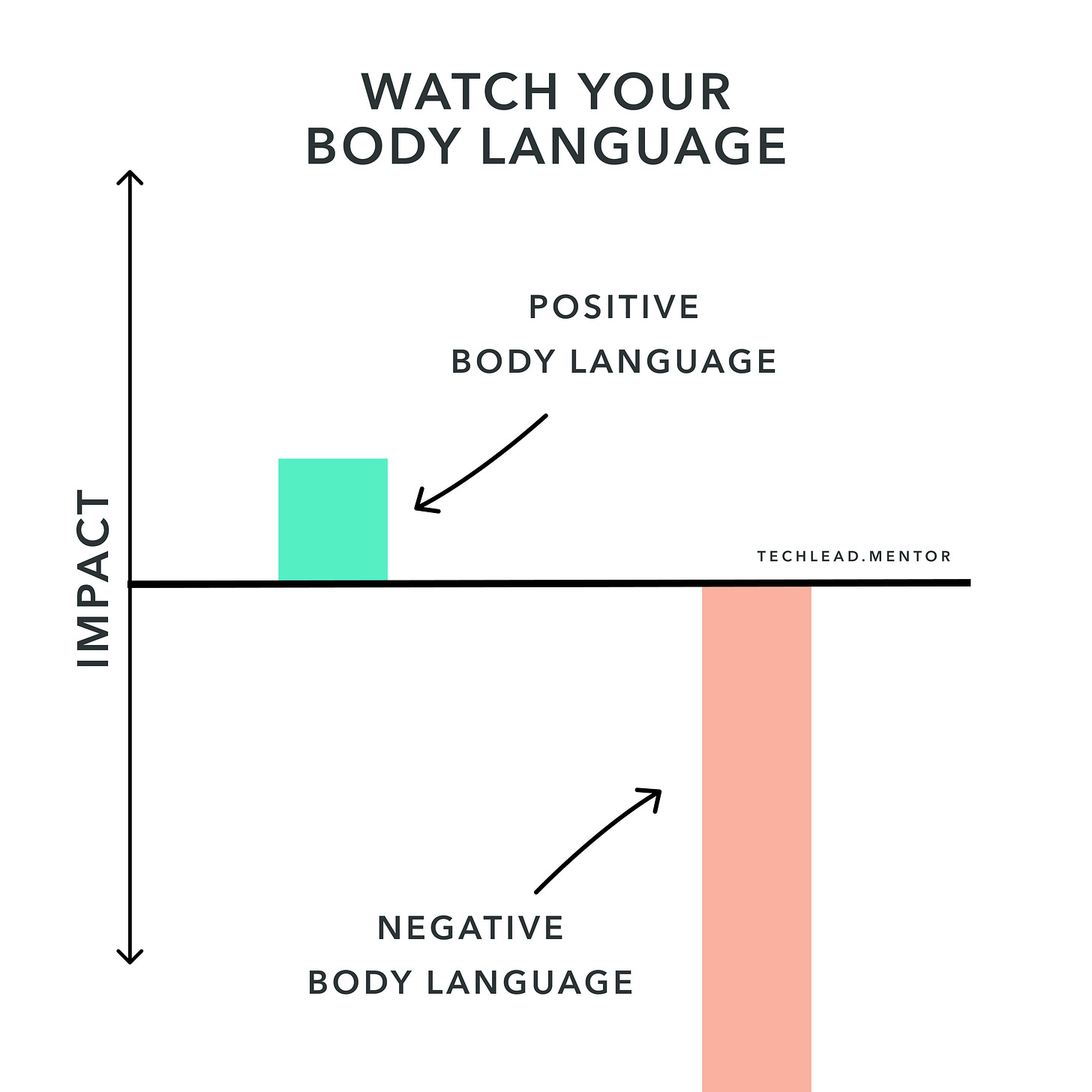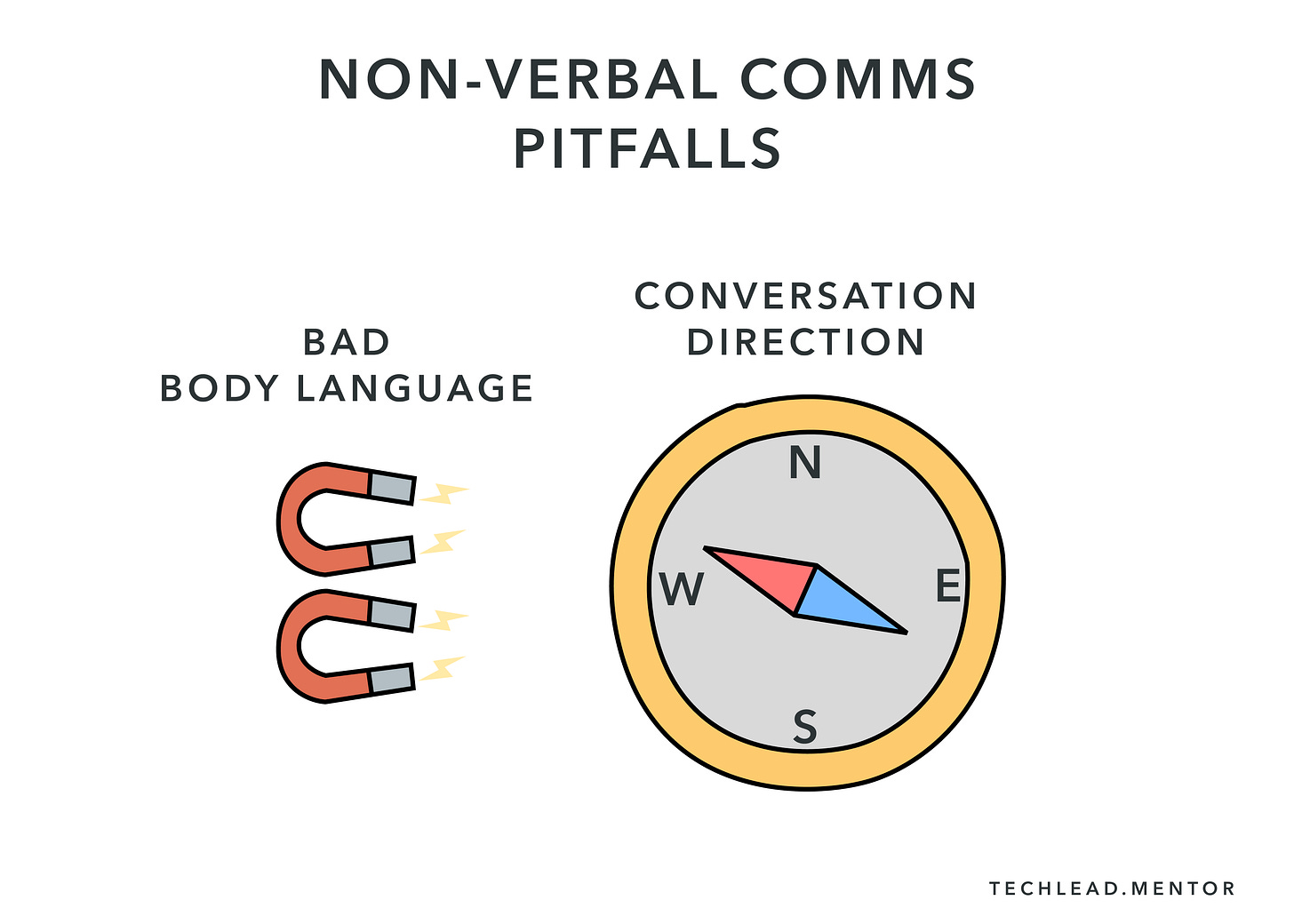5 Non-Verbal Behaviors Killing Team Health
Identify and manage non-verbal signals to elevate your leadership skills.
Ever been in a meeting where a teammate looked frustrated? Or know someone who keeps a poker face all the time?
That doesn’t feel good, right? I get very distracted when I see unwanted non-verbal signals. Also, I get upset when people seem disinterested.
Unchecked negative non-verbal signals can severely affect your team’s morale. However, when you learn to recognize what those signals say you can manage concerns effectively.
Based on my experience, I will share 5 annoying non-verbal behaviors, how I avoid exhibiting them, and how to deal with them.
The article assumes the engineers exhibiting these behaviors have no malicious intent.
🙄 1. Silent but Irritated
The person
rolls their eyes when they hear something “stupid”.
exhales heavily when someone disagrees with them
This can upset the speaker and instill fear in junior engineers.
How I avoid being this person
I recognize that I can get frustrated if I listen to unjustified disagreements multiple times. While it is easy to express my disagreement with a scoff, I force a smile and say:
“I don’t agree with that and <my reasons & examples>”.
“I may come across as a broken record, but this idea does not work because <reasons>”
One of the best compliments I got after a frustrating discussion was, that I appeared calm and pleasant but also held my ground.
How I deal with this person
Don’t call out this behavior as that puts them in a defensive mode.
It is possible they are not feeling heard. So, I ask:
“<Name of the person>, you don’t seem convinced? Is there something that worries you?”
Calling out their name and asking genuine questions makes them feel heard.
🗣️ 2. Annoying Interrupter
The person appears eager to interrupt the speaker and can’t seem to wait for their turn. This behavior can be distracting when the speaker is trying to make their point.
How I avoid being this person
By nature, I am an impatient person so this one is hard. When I hear partial information, I like to get clarity soon. However, I force myself to:
Listen until the speaker has delivered their core message.
Avoid rushing to press the “raise hand” option in Zoom or make that impatient-to-speak face.
Write down my questions so that I don’t fear forgetting them.
How I deal with this person
I look away from the person who has that expression if I am not speaking for long.
If I am going to speak for long then I will let the room know - “Let me finish this part before I take questions”.
Note: Don’t speak for multiple minutes or switch topics before taking that interruption.
😕 3. Ever Confused
The person gives a puzzled look to everything you say but asks no follow-up questions.
Long back, I worked with someone senior who always had this look. The “look” bothered me a lot but when I asked them if they had questions they would say ‘no’. Minutes later they would complain they didn’t understand me. It felt frustrating to have any kind of discussion with them.
How I avoid being this person
I would just tell folks that I have a certain look when I listen intently. So they know to excuse it.
If I need time to process a complex topic then I will ask the speaker to slow down.
I will let them know that I am confused. Next, I will paraphrase my understanding and ask them to fill in the blanks.
How I deal with this person
The best thing that works for me is saying: “<Name>, you look confused. What part isn’t clear?” “This is important and I want your input. So, help me clarify this to you”.
Saying ‘“You look” confused’ forces them to either ask questions or fix their expressions.
My interactions with the senior I mentioned above made me feel stupid. I hesitated calling them out. Finally, one day I discussed how I felt in a private discussion. I focused on what I observed and how I felt. I didn’t accuse them. They were receptive and said they would work on it in the future.
😐 4. Non-Appreciative
The person has blank expressions when they agree with a plan or when a teammate shares an accomplishment. This can leave the speaker wondering if the person even “cares” or “agrees”.
How I avoid being this person
Be an active participant in the discussion.
If I am a key decision-maker, then I will appear agreeable and say "yes" if I agree. If not, I will speak up.
An achievement may be minor to me, but to an intern, it can be their highlight of the month. As the team lead, I remind myself to say a few words of appreciation in such situations.
How I deal with this person
I explicitly ask this important stakeholder if they agree with the plan and if they have any concerns. Asking about specific concerns helps people voice them.
I privately and respectfully nudge my teammate to share a word of appreciation if they appear unappreciative towards their mentees.
🤷♂️ 5. Ignorer
This person avoids making eye contact or taking inputs from certain “junior” or “less important” people in discussions. However, they seem approachable to the “more important” people.
This builds imposter syndrome amongst the junior engineers and they will be hesitant in speaking up or interrupting this person.
How I avoid being this person
I can be biased against someone if they made no-so-great suggestions in the past. I remind myself to listen to every new input based on its merit.
In a fast-paced conversation with the “important known folks”, I can ignore some new faces. I make a note if others are waiting to chime in and pause for them to speak.
How I deal with this person
I encountered this quite a bit in my career. Most often, it was benign. During complex discussions, people are in a zone and don’t realize who they are ignoring.
What works for me:
I will grab attention by saying the core message first in a sensational/direct way.
Eg: “This idea does not work!” or “We are ignoring one big problem”.
I meet with the stakeholders 1:1 to discuss the topic. That has helped me build a good rapport.
Parting Note
It’s crucial to remember that while some "negative" non-verbal behaviors might annoy you, they can also be windows into deeper issues within the team. Recognizing and addressing these behaviors thoughtfully can elevate your leadership skills.
Note, that not every issue requires a confrontation. Sometimes, understanding and adapting to these behaviors can be just as effective. However, if a behavior consistently hinders teamwork or morale, addressing it openly and constructively becomes essential.
Seen other annoying non-verbal behaviors in your team? Share them in the comments.
🎤 Announcement
I have turned on “pledge” on my newsletter and considering enabling paid soon.
You may wonder - Why paid? Don’t you have a full-time job that pays well?
I hesitated a lot to make this decision. It felt “wrong” but here is what convinced me:
I am spending money on tools & subscriptions to keep this newsletter going. So, it seemed fair to at least not make a loss running it.
Getting $$$ for my content is a great way to get additional validation that readers love my content.
Will I have to pay for articles now?
No. For the foreseeable future, almost all articles will be free when they come out. I will add a paywall to a subset of my articles after a few weeks. So, all you early readers can continue enjoying the benefits for no charge.
If you enjoyed this article then hit the ❤️ button. It really helps!
If you think someone else will benefit from this, then make sure to 🔁 share this post.




These are so on point. Nr. 3 especially grinds my gears, makes everyone else work harder to get them to say what they really think
These are great! The only one I might be a little careful about deploying would be the "You look confused" line. I think it depends on who you are addressing and what your relationship is like with that person, but it may be a little more sensitive to say something along the lines of "Hey x, do you want me to go over anything a bit more?"